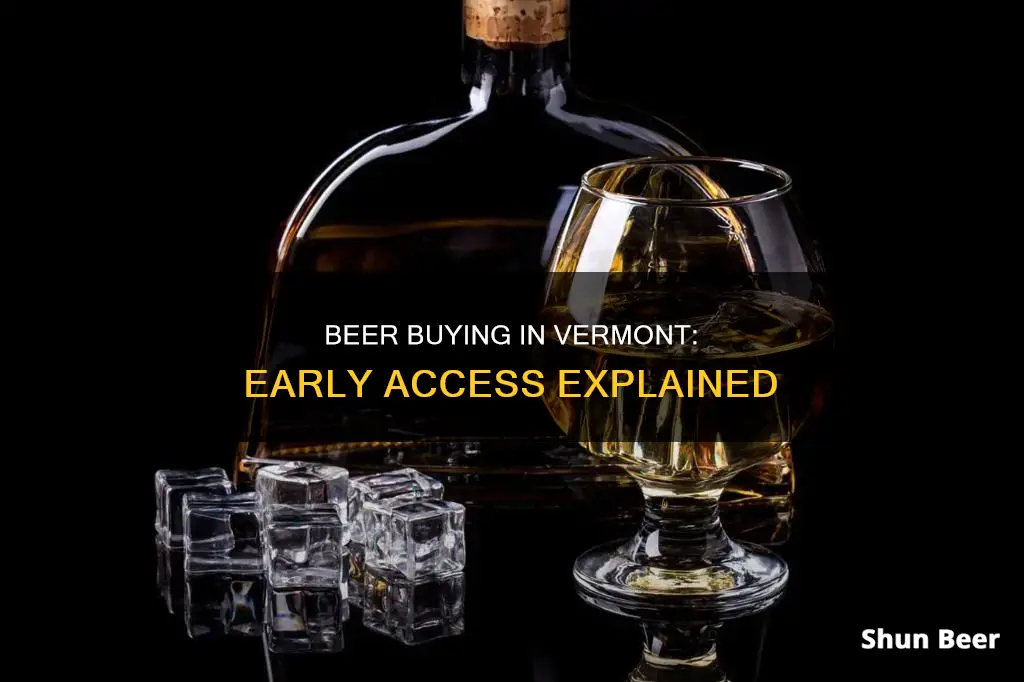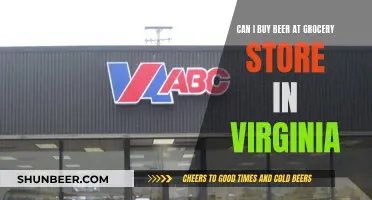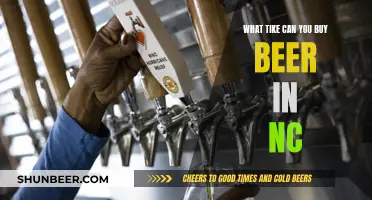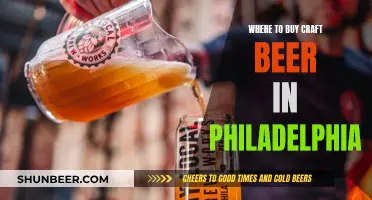
Vermont's alcohol laws are relatively relaxed compared to other states. The state allows alcohol sales seven days a week, with on-premise retailers, such as bars and restaurants, permitted to sell between 8 am and 2 am. Off-premise retailers, including grocery stores, can sell alcohol from 6 am to midnight. The minimum drinking age in Vermont is 21, and the state has strict laws against drunk driving, with a blood-alcohol content (BAC) limit of 0.08 per cent.
| Characteristics | Values |
|---|---|
| Days beer can be bought | 7 days a week |
| On-premise retailer sale timings | 8 am to 2 am |
| Off-premise retailer sale timings | 6 am to midnight |
| Dry counties | None |
| Dry towns | 4 |
| Minimum drinking age | 21 |
| Minors drinking with parents | Not allowed |
| Culinary students drinking exception | Allowed for students above 18 |
| Open container law | Allowed |
| DUI limit | 0.08% BAC |
| DUI limit for drivers under 21 | 0.02% BAC |
| DUI penalty for the first offense | License suspension for 90 days |
| DUI penalty for the second offense | License suspension for 18 months |
| DUI penalty for the third offense | License permanently revoked |
What You'll Learn

Vermont's alcohol laws
Vermont has no dry counties, but there are 4 dry towns where alcohol cannot be purchased. The minimum drinking age in Vermont is 21, and there are no legal exceptions for minors, including drinking with parental approval. The state is a control state, meaning it is directly involved in the alcohol industry and controls the distribution of liquor.
Vermont's drinking laws cover containers for alcohol and driving under the influence or with alcohol in the vehicle. It is illegal for a passenger or driver of a motor vehicle to possess an open container of alcohol, and it must be placed in the trunk, a locked glove box, or behind the rearmost upright seat. There are exceptions for passengers in commercial vehicles, such as limousines, and people in the living area of a motorhome.
The legal limit for drivers under 21 years old in Vermont is 0.02% BAC, while for drivers 21 and older, it is 0.08% BAC. Commercial drivers have a legal limit of 0.04%, and school bus drivers have a limit of 0.02% BAC. Penalties for driving under the influence can include license suspension and jail time.
Alcohol delivery is legal in Vermont, but there are some rules and restrictions. Deliveries must be made by the licensee or their employees, and off-premise retailers can only deliver up to 12 cases or 36 gallons of beer, or 12 cases or 29 gallons of wine, per year. Orders from restaurants or bars must include food, be sealed with tamper-evident methods, and be labeled with ingredients, serving size, and alcohol content.
Buying Beer on Sundays: Is It Legal?
You may want to see also

Where to buy beer in Vermont
Vermont's alcohol laws are not overly restrictive, and you can buy beer 7 days a week. The hours for buying beer vary depending on the type of retailer. On-premise retailers, such as bars and restaurants, can sell alcohol between 8 am and 2 am. Off-premise retailers, such as grocery stores, can sell alcohol between 6 am and midnight.
Vermont has no dry counties, but there are 4 dry towns where alcohol cannot be purchased. Outside of these towns, there are several places where you can buy beer in Vermont:
Bars and Restaurants
Vermont bars and restaurants can sell beer, wine, and liquor every day of the week, from 8 am to 2 am. To-go orders can include alcohol between 10 am and 11 pm and may be in the form of growlers. Additionally, restaurants without liquor licenses can usually allow customers to bring their own alcohol (BYOB).
Gas Stations
Vermont gas stations are permitted to sell beer and wine every day from 6 am to midnight. All sales must be for off-premise consumption, and the alcohol must be in its original packaging.
Grocery Stores
Grocery stores in Vermont can sell beer and wine for off-premise consumption, from 6 am to midnight daily. The alcohol must be in its original packaging. Some grocery stores may have an attached liquor store to sell hard liquor, but it is considered a separate area.
Package and Liquor Stores
Liquor stores in Vermont offer beer, wine, and liquor from 6 am to midnight every day. All sales are for off-premise consumption, and the alcohol must be in its original packaging.
Breweries and Taprooms
Vermont breweries and taprooms can sell beer, wine, and liquor produced by themselves or other Vermont breweries, from 6 am to midnight daily. Sales can be for both on and off-premise consumption and may include original packaging or growlers.
Buying Beer at the College World Series: What's Allowed?
You may want to see also

The legal drinking age in Vermont
Vermont's drinking laws are considered fairly straightforward and not particularly strict compared to other states. The laws are in place to discourage dangerous behaviour involving alcohol and to protect the general public.
Vermont is not a dry state and does not prohibit the production or sale of alcohol. Alcohol can be purchased 7 days a week, and there are no extra restrictions on Sundays. On-premise retailers such as bars and restaurants can sell alcohol between 8 am and 2 am, while off-premise retailers such as grocery stores can sell between 6 am and midnight.
Buying Beer at Allen Fieldhouse: What You Need to Know
You may want to see also

Open container laws in Vermont
Vermont has an open container law, which means that no previously opened bottles of alcohol may be transported in the main compartment of a vehicle. Open containers must be stored in the trunk of the car, in a locked glove box, or behind the rearmost upright seat if the vehicle does not have a trunk.
There are two exceptions to this law. The first is that passengers in a commercial vehicle, such as a limo, are allowed to possess and consume alcohol, as long as it is not within reach of the driver. The second exception is for people in the living area of a motor home or trailer coach.
Vermont law prohibits a driver or passenger from possessing or consuming an open container of alcohol or cannabis in a vehicle if the vehicle is operated on a public highway and the seal of the container has been broken. In Vermont, an open container includes any unsealed container of alcohol or any open container of marijuana.
The maximum fine for alcohol open container violations is $25 for drivers and passengers. However, it is important to note that the consumption of alcohol in a vehicle carries a maximum fine of $500 for drivers and $25 for passengers.
Buckhorn Beer: Still Available or a Faded Memory?
You may want to see also

DUI laws in Vermont
In Vermont, you can buy beer and alcohol 7 days a week. On-premise retailers like bars and restaurants can sell alcohol between 8 am and 2 am, while off-premise retailers like grocery stores can sell between 6 am and midnight. The state also allows alcohol delivery and growlers.
Now, onto Vermont's DUI laws. In Vermont, it is illegal to operate, attempt to operate, or be in actual physical control of any vehicle on a highway when you are under the influence of intoxicating liquor (DUI) or when your blood alcohol concentration is 0.08% or more (DWI). You can also be charged for operating under the influence of drugs, including legal prescription drugs, if these impair your ability to drive safely.
The penalties for a DUI conviction in Vermont depend on how many prior convictions you have. Here are the penalties for a first, second, and third DUI conviction:
First DUI Conviction in Vermont
- Up to 2 years in jail
- Up to $750 in fines
- 90-day civil suspension of your Vermont license or privilege to operate a vehicle in Vermont
- License suspension for 90 days
Second DUI Conviction in Vermont
- Up to 2 years in jail (with a minimum of 60 hours in jail or 200 hours of community service)
- Up to $1,500 in fines
- License suspension for 18 months
- Vehicle immobilization for 18 months or until the driver's license is reinstated
Third DUI Conviction in Vermont
- Up to 5 years in jail (with a minimum of 96 hours in jail)
- Up to $2,500 in fines
- Lifetime license suspension, with the possibility of applying for reinstatement after 3 years
- Vehicle forfeiture and sale of the vehicle used in the DUI
Additional Penalties for High BACs
Anyone convicted of a second or subsequent DUI with a BAC of 0.16% or greater will be prohibited from driving with a BAC of 0.02% or more for 3 years after the conviction. During this time, driving with a BAC above 0.02% will be considered a DUI and penalized accordingly.
Aggravated DUI Penalties for Deaths and Injuries
DUIs that result in fatalities carry a fine of up to $10,000 and a maximum of 15 years in prison. A DUI resulting in an injury carries a fine of up to $5,000 and a maximum of 15 years in prison. An aggravated DUI charge does not exclude prosecution for vehicular assault or manslaughter.
Driver's License Reinstatement
To get your driver's license reinstated after a DUI conviction in Vermont, you must:
- Serve your suspension
- Pay court fees
- Complete a counseling program (Project C.R.A.S.H., administered by the Vermont Department of Health)
- Obtain S.R. 22 insurance for 3 years
- Pay a reinstatement fee of $71
- Comply with all court orders
- Pay all fines
- Complete the suspension period
- Be free of any pending criminal charges
- Complete an alcohol and driving education program for a first offense, or an alcohol and driving rehabilitation program for second and third offenses
- For a third offense, show proof of progress in therapy and 3 years of abstinence from drugs and alcohol (evidenced by IID use without violations)
Where to Find Snow Beer in the US?
You may want to see also







